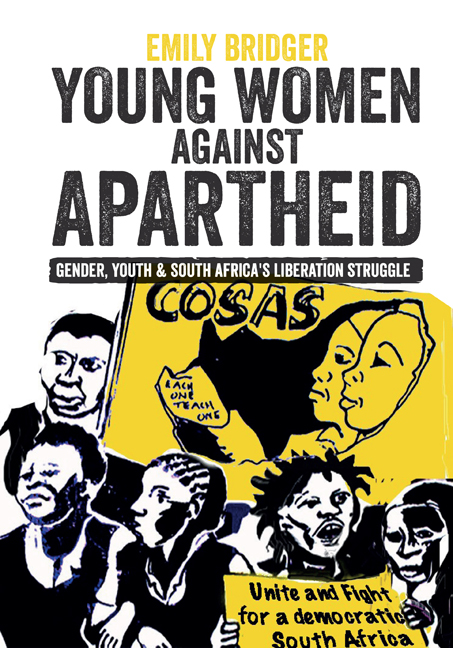Book contents
- Frontmatter
- Dedication
- Contents
- Acknowledgements
- List of Acronyms and Abbreviations
- Glossary
- Map of Soweto
- Introduction
- 1 African Girlhood under the Apartheid State
- 2 The School: Becoming a Female Comrade
- 3 The Home: Negotiating Family, Girlhood, and Politics
- 4 The Meeting: Contesting Gender and Creating a Movement
- 5 The Street: Gendering Collective Action and Political Violence
- 6 The Prison Cell: Gender, Trauma, and Resistance
- 7 The Interview: Reflecting on the Struggle
- Conclusion
- Bibliography
- Index
- Related James Currey titles on South & Southern Africa
4 - The Meeting: Contesting Gender and Creating a Movement
Published online by Cambridge University Press: 09 February 2021
- Frontmatter
- Dedication
- Contents
- Acknowledgements
- List of Acronyms and Abbreviations
- Glossary
- Map of Soweto
- Introduction
- 1 African Girlhood under the Apartheid State
- 2 The School: Becoming a Female Comrade
- 3 The Home: Negotiating Family, Girlhood, and Politics
- 4 The Meeting: Contesting Gender and Creating a Movement
- 5 The Street: Gendering Collective Action and Political Violence
- 6 The Prison Cell: Gender, Trauma, and Resistance
- 7 The Interview: Reflecting on the Struggle
- Conclusion
- Bibliography
- Index
- Related James Currey titles on South & Southern Africa
Summary
Bessie became engaged in student politics as a young teenager in Dlamini, Soweto. Of all the women interviewed for this book she was the first to join COSAS in 1982 at the age of sixteen. During her initial years in the organisation she was often the only young woman present at COSAS meetings, but this soon changed as she focused much of her efforts on recruiting more female students to the struggle. This helped propel her into a leadership role in the organisation, first on the Soweto executive and then in the regional executive of COSAS. Bessie understood that there were certain societal factors that tended to hold girls back from the struggle. Women were expected to remain in the home, cooking, cleaning, and raising families, whereas the more challenging domains of politics and war were ascribed to men, she explained. ‘Our struggle was seen like a man's domain, you know?’ But Bessie insisted that she never witnessed such attitudes affecting female comrades in COSAS. Personally, she never experienced derision or disrespect from the young male activists she worked alongside. ‘They were so wonderful,’ she said of her male comrades. ‘I never had any problems…I was respected, highly respected.’ She shunned the idea of organising separately as women, believing that she personally could grow more as an activist by participating alongside male comrades. ‘I felt I grew faster, I grew much stronger engaging directly with men,’ she explained.
Bessie's account of being respected and treated as an equal by her male comrades jars with the previous historiography on young activists during these years, which describes comrade culture as deeply masculinist and disparaging towards young women. This chapter seeks to understand such contradictions and asks how young male and female activists related to one another at a time when township society was highly patriarchal, and during a period when young men increasingly asserted their masculinity through participating in the struggle. It explores both the gender relations that developed within the student and youth movement and how women remember these relations today, asking important questions about their overwhelmingly positive narratives.
Unlike the others in this book, this chapter does not address a single or concrete space or place, but rather a conceptual one: the ‘meeting’ – where young activists discussed ideology, shared dreams for the future, and planned their actions.
- Type
- Chapter
- Information
- Young Women against ApartheidGender, Youth and South Africa's Liberation Struggle, pp. 95 - 126Publisher: Boydell & BrewerPrint publication year: 2021



